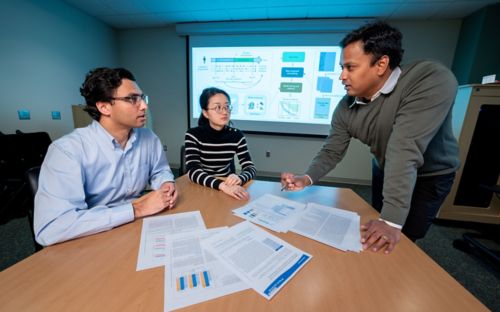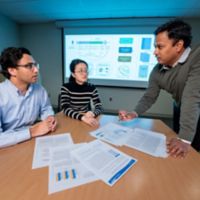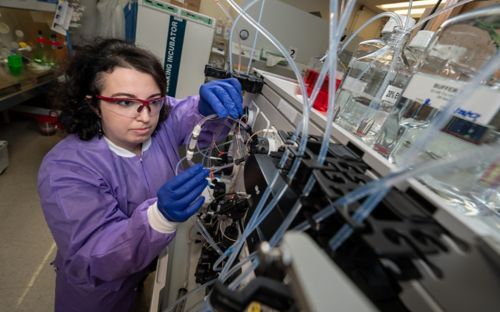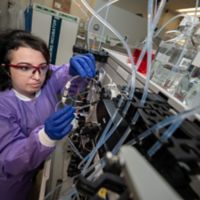St. Jude is easing pediatric sickle cell disease patients’ transition to adult care

Jerlym Porter, PhD, MPH, studies the psychosocial effects of sickle cell patients. Part of her research finds ways to get older sickle cell patients to continue with treatment or therapy.
St. Jude has a long history of research in sickle cell disease. In fact, the first research grant ever received by the hospital was for the study of sickle cell disease. In 1983, a St. Jude patient with leukemia who also had sickle cell disease was the world’s first to be cured of the disease through a stem cell/bone marrow transplant.
Patients with sickle cell disease have a genetic mutation that causes abnormally shaped blood cells. They're not round but are shaped like bananas. They're sticky and inflexible. When these cells stick to each other, oxygenated blood doesn’t flow easily. While very painful, the complications go well beyond physical pain.
Patients with this disorder may experience issues in psychosocial and cognitive areas, treatment adherence and disease management, and the transition process from pediatric to adult care. Patients often times experience negative perceptions associated with living with sickle cell disease, leading to medical mistrust and overall health disparities.
Patients with sickle cell disease can live long, high-quality lives through regular checkups and hydroxyurea medication. The transition period from childhood to adulthood is a challenging one, but St. Jude Children’s Research Hospital is making major strides in research, educational and social programs, and technological tools to ease this transition.
Start the sickle cell transition early
In 2007, the Department of Hematology created a transition program to prepare patients for the transfer of care to adult providers. When patients receive care in the Teen Clinic starting at age 12, they enter the transition program, which addresses many facets of the changing lives of tweens and teens with sickle cell disease. The patients meet with special liaisons who span the clinic and the patients’ teachers and schools.
The transition program includes a multidisciplinary team charged to provide education and teach skills. Social workers have the patients complete a medical history form to see how much personal medical history they know. This provides a starting point for a conversation about the information the patient will need to report to the adult provider during an adult clinic visit.
STARR coordinators, who are licensed teachers, check in with patients about academic and vocational goals and the steps toward achieving their goals. They also advocate on behalf of patients for school accommodations. In addition, a genetic educator discusses the reproductive risks associated with sickle cell disease. Case managers provide additional education about complications, disease management, healthy eating and risky behaviors. Because sickle cell disease can affect the brain and cognitive issues, patients complete cognitive testing with psychologists and neuropsychologists to identify the patient’s strengths and weaknesses, track how well treatments are working, and help with academic and vocational planning.
St. Jude also offers a role-playing Skills Lab, where teens focus on learning three self-management skills: making appointments with an adult provider, understanding their insurance cards and understanding prescriptions.
St. Jude also has a monthly Hematology Teen/Caregiver support group where patients and caregivers come together to learn from one another and feel supported. Group activities include college trips, theater performances, community service, team-building, and life skills activities.
At 17, patients and their caregivers tour two adult sickle cell centers to learn about the services offered at the adult clinics. After the tour, the patients and caregivers attend a luncheon and hear presentations from young adult patients with sickle cell disease who have transitioned and caregivers of patients who have transitioned to provide an additional perspective of life after St. Jude.
We're fortunate that we have two adult programs we're able to transition our patients to, and we have a unique partnership with the Methodist Healthcare Comprehensive Sickle Cell Center where pediatric and adult providers overlap care to follow patients into young adulthood.
Stepping into adulthood with sickle cell disease
We are developing technological supports to increased disease knowledge and self-management skills. The Sickle Cell Transition E-learning Program (STEP) is a web-based education program with interactive videos to teach information important to know for transition to adult care. St. Jude has developed the InCharge app to help patients to take their hydroxyurea medication. Patients receive reminders in the app to take their hydroxyurea. This app includes a symptom tracker for pain level and graphs showing the connection between pain level and taking their medication. The app has educational information about sickle cell and hydroxyurea. Patients can even assign accountability partners who receive notifications if the patients don’t take their medication.
We’re finding new methods to track patients during the transition period from pediatric to adult care. We hope to have data soon that shows patients are being better equipped to learn and adhere to all the skills and obtain the knowledge they need to live long and healthy lives.






